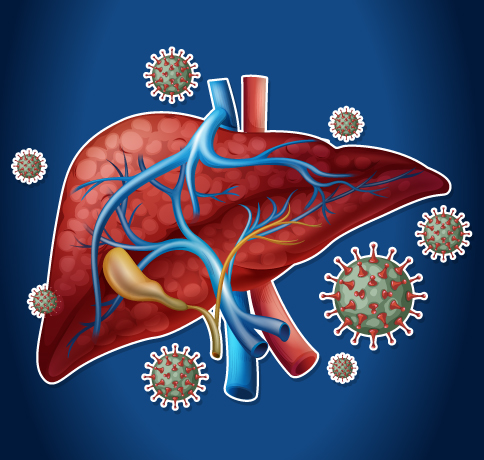Hepatitis C is a disease caused by a virus that infects the liver. The virus, called the Hepatitis C virus or HCV is just one of the hepatitis viruses. The other common hepatitis viruses are A and B, which differ somewhat from HCV in the way they are spread and treated.
Diagnosing Hepatitis C
Because HCV infection usually produces no symptoms or very mild symptoms during the early stages, many people don’t know they have it until liver damage shows up – sometimes decades later – during routine medical tests. Some people who get HCV have it for a short time (up to six months) and then get better on their own. This is called acute Hepatitis C. But most people (about 75% – 85%) will go on to develop chronic (or long-term) Hepatitis C, meaning it doesn’t go away.

Treatment for Hepatitis C depends on several factors, including:
How much virus is in your body (your viral load)
The genotype or strain of Hepatitis C you have
If you have liver damage, such as cirrhosis
What other health conditions you have
Your response to any previous treatments for HCV
What is Hepatitis C?
Hepatitis C is a virus that affects the liver. It is the leading cause of liver failure and end stage liver disease and is a major cause of liver transplants in the United States.
When first infected, a person can develop an “acute” infection, which can range in severity from a very mild illness with few or no symptoms to a serious condition requiring hospitalization. Acute hepatitis C infection is a short-term illness that occurs within the first six months after someone is exposed to the hepatitis C virus. For most people, acute infection leads to chronic infection but for reasons that are not known, approximately 15% to 25% of people clear the virus without treatment.
Chronic hepatitis C infection is much more common. It can last a lifetime and lead to serious liver problems, including cirrhosis (scarring of the liver) or liver cancer.
An estimated 0.6 crore to 1.2 crore Indians are infected with hepatitis C, yet a whopping 75% are not aware that they carry the virus. Each year, more than 25,000 Indians become infected.
Hepatitis C has been aptly called the silent epidemic. A person can have the virus for years – even decades — before they experience symptoms and by that time, liver damage has often occurred.
HCV is transmitted through direct blood-to-blood contact. It can be contracted and spread through blood transfusions (performed before 1992), unprotected sex, intravenous drug use with dirty or shared needles, body piercings and tattoos using non-sterile ink and needles, and sharing personal items such as toothbrushes, razors and nail clippers. It is not spread through exposure to sweat, urine or tears or close contact with an infected person who sneezes or coughs.
Since universal screening of blood and blood products did not occur until 1992, anyone who had a blood transfusion or organ transplant before that time should be tested. It is recommended that people be tested for HCV when Exposed to blood and body fluids (firefighters, healthcare workers)
Sharing toothbrushes, razors, nail clippers or other personal items with an infected individual
Using and/or sharing needles to inject drugs
Receiving tattoos and body piercings with unsterile needles (including ink)
Women thinking about becoming pregnant
Born to an infected mother
Receiving long-term hemodialysis
Having unprotected sex with multiple sex partners or have a history of sexually transmitted diseases
Most people initially have few or no symptoms for many years. When symptoms do emerge, they may present as fatigue, nausea, achiness, abdominal pain or flu-like symptoms.
Yes, you are considered cured if the hepatitis C virus is not detected when measured with a blood test three months after you’ve completed treatment. This is called a sustained virologic response (SVR) and data suggest that you will stay virus free indefinitely. And with newer drugs coming to market, cure rates of up to 90% have been seen in patients with hepatitis C.
Even more important sustained virologic response has been associated with lower rates of liver cancer, cirrhosis and all-cause mortality. This means that getting rid of hepatitis C allows individuals to live longer lives.
Will a person who has Hepatitis C ultimately need a liver transplant?
Undiagnosed and untreated hepatitis C can damage the liver to the point where a person could need a transplant. Not every person will develop advanced disease from hepatitis C.
But because we can’t always predict what will happen over time, the safest course for most people is to modify anything that can injure the liver before they have advanced disease. This includes curing the virus before there is extensive disease.
What is the difference between Hepatitis A, Hepatitis B and Hepatitis C?
Although they are all viruses that infect the liver, how you get them and how they can cause long-term health problems differ. Hepatitis A can be contracted through food or water that has been contaminated by fecal matter and raw shellfish. It does not lead to chronic disease and can be prevented through vaccinations. People generally recover within three to six weeks with no permanent liver damage.
Unfortunately, there are no preventative vaccinations for HCV, but early detection and advances in treatment can cure many strains of the disease.










